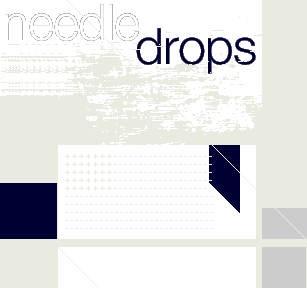


++ Contact Philip Sherburne ++
++ Recently ++
Tuesday, November 29, 2005 = The Stooges Unearthed (Again)
Tuesday, November 8, 2005 = Documenting Beulah And DCFC
Tuesday, November 1, 2005 = Out-Of-Control Rock 'N' Roll Is Alive And Well
Tuesday, October 25, 2005 = Just In Time For Halloween
Monday, October 3, 2005 = The Dandyesque Raunch Of Louis XI
Monday, August 15, 2005 = The Empire Blues
Tuesday, August 9, 2005 = David Howie's Sónar Diary
Monday, July 25, 2005 = Hot Sounds For Summertime
Monday, June 27, 2005 = Overcoming Writer's Block At Sónar 2005
Monday, June 4, 2005 = Cool New Sounds To Download Or Stream
++ Needle Drops Archives ++
View full list of Needle Drops articles...
|
|
 |
July 12, 2002
++ Essential Electronic Comps For Summer
Like cars, T-shirts, and soda cans, there are already more compilation CDs than the world will ever need. This is especially true for the electronic music market. When dance music broke in the U.S., record companies were faced with a conundrum: how to market a musical form which existed primarily on 12-inch vinyl singles to a generation of consumers who were accustomed only to full-length albums — on aluminum, at that?
Enter the compilation, and its somewhat more sophisticated cousin, the mix CD. The comp, a form that had been pioneered by independent rock labels (as labels gradually defined more and more specialized styles, and, in some cases, supplanted particular artists as creative forces in their own right), turned out to be the perfect vehicle for introducing American listeners to all the faceless, awkwardly monikered artists they'd never heard of. The compilation format also solved another problem for dance music: unlike the staunchly independent pop song, beat-driven music almost always travels in a posse. Mix CDs and comps, in replicating the form, if not the experience, of the dance club, bookended beats with more beats in a way that suggested a never-ending rhythmic continuum unspooling at a steady BPM.
But as the number of electronic music labels peddling ever more specialized niche music has expanded, things have gotten out of hand. The shelves in the electronica aisle sag under the weight of undistinguishable collections of techno, house, tech-house, hard house, hard techno, trance, tech-trance, progressive house, progressive trance — you get the point. (I'm still waiting for someone to invent a trance-house hybrid called "trounce.")
As with the explosion in prescription "lifestyle drugs" — Prozac, Zoloft, Viagra, and all the other conspicuously consumable capsules padding the drug companies' bottom lines — every month seems to see the introduction of a new chillout series, adorned with swimsuit-clad models and surreal sunsets. Relaxation and titillation in a jewel case! (Perhaps the next step in the leisure-management industry is to pursue the synergy between antidepressants and chillout music. You could market a drug called Ibizax, for instance, and include it in sample dosages with comps like Ultra.Chilled.)
As branding gets ever more sophisticated, compilation series threaten to supplant labels themselves as the loci of particular sounds. Back to Mine and Another Late Night, for instance, seem to be squaring off as the Coke and Pepsi of the chillout industry. (Or perhaps that's the For Dummies and Idiot's Guides.)
Meanwhile, as rock music returns to the hipster throne and the bottom falls out of the electronica market, it becomes harder and harder for journalists to place artist features on genuinely interesting electronic musicians. Undeterred, the publicists keep calling, wondering why you're not interested in a story on Global Blunderground Volume 357.
Still, every now and then even the most jaded critic can find something to love in a compilation. This summer seems to have sprouted a particularly good crop. So with apologies to the noble defenders of the artist album, I present a sampling of 2002's best electronic music comps.
++ Off Limits 3 (Sonar Kollektiv/Recreation): Sonar Kollektiv, a consortium of some of Germany's finest deep house and broken beat artists and labels, was launched as a project of the Jazzanova collective, but Sonar Kollektiv's output has often eclipsed that of the better-known brand name. Off Limits 3 is the third installment of a mix series presented by DJ Dixon, and like its predecessors, the album presents an immaculately mixed and sequenced meander through the deep side. Where volumes 1 and 2 stuck closer to traditional deep house, the third edition reflects the recent '80s resurgence in dance music. You won't hear any "electro-clash" or other techno-punk offerings, but in tracks from Morgan Geist, Meitz, me, Atjazz, and John Tejada with Titonton Duvante, you'll find plenty of glossy pads, wheezing G-funk leads, and fat, brassy handclaps. Beneath it all, augmented chords and opal-tinged changes swirl, a testament to house music's debt to jazz and R&B alike. Scrawl it on your PeeChee: Fusion Rulez!
++ Futuristic Experiments #004 (Background): I keep saying that I've heard all the minimal techno I ever need to hear, but something about that beat seems to get under my skin. Skin. Skin. Skin. (Sorry, I was grooving again.) Andy Vaz's label Background, specializing in dubbed-to-distraction techno and microhouse, hails from Germany (I know, who'd've thunk it?) — Düsseldorf, to be precise. After launching with the "Futuristic Experiments Chapter One" 12-inch, featuring Ectomorph, Todd Sines, Terrence Dixon, and DJ Hyperactive, Background has continued the series with submissions from subliminalists like Sutekh, Kit Clayton, Stewart Walker, Gramm and Dean Decosta. The latest installment, and the first to appear on aluminum, is the label's furthest-ranging foray yet. Some of the familiar minimalism is here: Donnacha Costello and Rhythm_Maker both continue to tame their jitters with delicate sips of potent, punchy bitters. But Todd Sines' "TS-Closed," which starts off as deep and bleepy as you'd expect, quickly builds into a moonrise organ glide that's both gentler and grander than his usual fare. Sutekh tears into "Roof Rack" like a tornado through a cowbell factory, while Dean Decosta tears the lid off his synth and digs in with the soldering iron, yanking and grafting with abandon.
++ Morris/Audio Presents Club and Home Entertainment (Morris/Audio): The title, almost laughably literal, invokes one of the 10 Great Clichés of dance music writing, the "dancefloor/armchair dichotomy." But I'll forgive the misstep, because the music's just too damned good. This is another collection of minimalistic dub techno that manages to find a way out of the cul-de-sac that trapped much of the genre during the past two or three years. Instead of the typical monochromatic pulsewash, Morris/Audio's artists — producers like Dub Taylor, Evil C, Jackmate, and The Dandy — take the familiar boom-tick pattern and populate it with elements that add up to a deep, sinewy funk: punchy bass lines, tightly syncopated hi-hats and dub stabs run through a welter of effects. The formula's no different from that used on dozens, perhaps hundreds of singles that appeared over the last five years on labels like Force Tracks, Kompakt, Shitkatapult, and the like — all are heavily indebted to Basic Channel/Chain Reaction's seminal approach to dubwise minimal techno. But where so much minimal techno sounds like a machine running almost too smoothly, the Morris/Audio collection showcases tracks that sound like they need their air filter changed: every beat has some kind of grit gumming up the works, throwing all the syncopations slightly off-kilter. Morris/Audio also displays a debt to rougher Chicago house, as in Synchrojack's "Recursive Function," which skips along on skippy hi-hats and a fidgety acid line. Best of all, it's sexy as hell. Jackmate's "Back that Bitch" is like a dirty postcard, showing the profile of techno, lean and filtered, straddling house's swollen, supine form. High-end squiggles sound like a fingernail scratching the underside of someone's arm, and the coaxing, incessant title refrain could keep you making mischief 'til the subwoofers blew.
++ One Step Ahead 2 (Straight Ahead): Like most everyone in this week's column, Switzerland's Straight Ahead is for the most part a vinyl-only label. So while they're charted by tastemakers like Gilles Peterson and Jazzanova, few outside the inner sphere of vinyl obsessives have actually gotten their hands on the label's gear. All of which makes compilations like this all the more useful. By virtue of its fractured chords, unconventional syncopations and freeform flow, Straight Ahead falls somewhere in that vague classification called nu-jazz, or future jazz, or broken beat, sharing affinities with labels like 2000 Black, Ubiquity, or Sirkus. Labelhead Alex Dallas's remix — as Earthbound — of The Underwolves' "Bird Song" hints at Victor Davies' club folk, or even Everything but the Girl's pristine and wistful pop, but it's built upon the rickety breakbeats that are the label's signature. Domenico Ferrari's "Commute" — fronted by the swooping vocals of New York poet and voice artist Latasha Natasha Diggs — fuses Blaxploitation funk, Badalamenti strings, and the spoken word spielings of a generation raised at the Nuyorican Poets' Café. The Straight Ahead family — also closely linked to a small Swiss label called Zest, featuring many of the same artists under different names — bears close ties to England's Attica Blues, and two of that band's members appear here: Tony Nwachukwu with the Rhodes-heavy rambler "Tec Know Jazz," and Charlie Dark (as part of Hearts of Oak) with the boom-smack groover "Danger Movin." The album's framed by a pair of near-still lifes — Nicole Willis' afternoon-lit "All the Time" and Victor Davies' Nick-Drake-on-Northern-Soul "Runaway Train" — but the center of the exhibit is all mobiles, spinning wheels and forms as organic as Andy Goldsworthy's leaf-and-branch constructions.
++ The Asthmatic Worm (Mobilé): Mobilé is a new label run by Heiko Hoffmann, the editor of Germany's Groove magazine, and its inaugural release is a collection of songs incorporating accordion and melodica. Polkaphobes take heart: devoid of oompah, the comp ranges from Burnt Friedman & Jaki Liebezeit's dub track "Rastafahndung" (a tribute to Jamaican melodica masters such as Augustus Pablo) to Dntel's gentle downtempo. Thrown into the mix are Maerz's Stereolabbish cycle "Bars 1,2,3,4," a dappled pool of Rhodes, melodica, guitar, and more, and Matthew Herbert's ode to Continental leisure, "Café de Flore," recorded under his Doctor Rockit moniker. As a showcase of one of my very least favorite instruments in the world, it's an unlikely candidate for my yearly top 10 list — but with sublime contributions from Múm, Sensoràma, Atom TM, Wechsel Garland, and Markus Nikolai, its place in the running is secure.
Next week: more essential comps.
|
| |
|